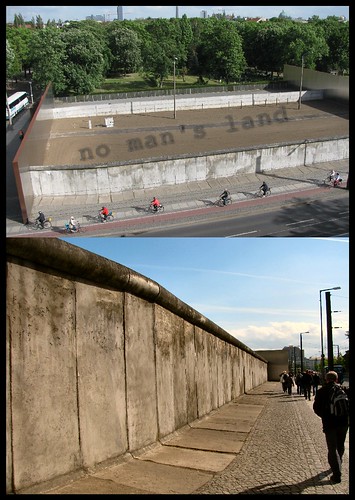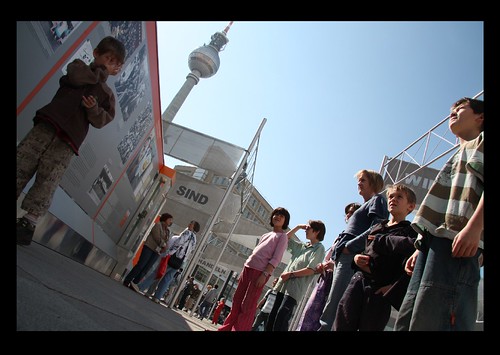Humpty Dumpty sat on a wall
by Rach, the ponderer
Berlin, Germany
We need to recite a few more nursery rhymes as we travel; Tgirl5, who was thoroughly familiar with the traditional version of Baa Baa Black Sheep at home, has obviously forgotten the words and now with poetic license and great flourish sings, “One for the little boy who lives down the drain.”
As for Humpty…….
It’s hard to imagine living in political bondage across the street from someone with freedom. West Berlin on one side, East Berlin on the other. And then one day the cold hard fact is made more explicit – up goes a wall. Just a wire fence actually, but it won’t be long before it is replaced by a cold hard concrete wall, an impenetrable concrete wall.
It seems strange. The wall actually surrounds the West, the free zone. Rather than being a wall to keep people in, it is expressly to keep people out – those East Germans, to be precise. But still, it imprisons inhabitants – although they do have the airport to escape from (if they have enough money). But as they have freedom, perhaps they do not wish to escape. It’s the East Germans, anyway, who were escaping. But the wall put an end to that. And those who tried were shot. Simple.
Nowadays you can follow the course of the wall for its entire 160km right through and around the city. Stones set into roads and footpaths mark the entire route in longlasting commemoration (just like the plaques you’ll see in front of some buildings, giving the names of Jews who were arrested at these addresses and who subsequently perished in concentration camps). A few sections of the wall remain, bearing witness to the events of the past, to ideologies, to a revolution won.

We climbed the observation tower, each new level reached, allowing a wider and wider view over No Man’s Land, across the wall to the other side. Did those who tried to escape realise exactly what the guards could see? How desperate were they? How frustrated at having their windows and doors boarded up, at having their lives watched in constant surveillance, at suffering events completely outside their control?

It’s twenty years since the wall came down. New commemorations are underway. In Alexander Platz a massive exhibition of posterboards displaying photos captioned in deutsch and English, with some television screens and glass-cased realia like suitcases and a teddy bear used to smuggle thousands of deutschmark out of the East, relays the story of the wall. As you read and look at the photos, a loud chanting erupts and goosebumps appear on your arms. You can hear the passion, the fervour, the intent, even if you cannot understand the words. You look round for the source. Loud speakers high above you; it might just be a recording, but it is quite unnerving. There you are looking at photos taken right where you are standing, the tower in the photo just to your right, the building beside it, still there today. Gone are the queues of people, gone are the demonstrating hordes, but you can easily imagine what it was like. Especially with the revolutionary rabble broadcast down from above.


Our wall sightings and exhibition wanderings take place over a few days. We walk by, we look, we ponder and it strikes me that what is history here, is current events in other parts of the world. We have seen (and been surprised by the sheer number of) surveillance cameras in public spaces in China. We have noticed the complete absence of outward observance of any religion other than saffron-robed monks in Laos. We have talked with Cambodians afraid, but willing to fight the system they were born into. And we have not even come close to the truly persecuted.
Freedom is not yet universal.
Tags: children, God, history, justice, postcard: Germany, quote




wow. once again words escape me…